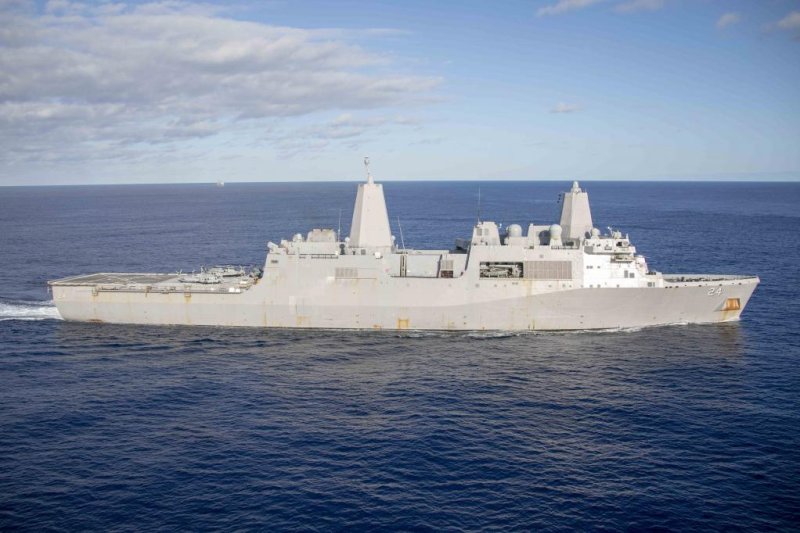The USS Arlington, a San Antonio-class amphibious transport dock ship, transits the Atlantic Ocean on December 24, 2018. On Friday, the Pentagon dispatched to ship to the Middle East. Photo by Mass Communication Specialist 2nd Class Megan Anuci/U.S. Navy
May 11 (UPI) -- The Defense Department is moving the USS Arlington amphibious transport dock ship and a Patriot surface-to-air missile battery to the Middle East for additional military strength amid rising tensions with Iran.
On Friday, the Pentagon announced the ship and an additional launching system for PAC-3 missiles are part of the U.S. Central Command's original request from earlier this week for additional forces. The command is based in Qatar.
They will join the USS Abraham Lincoln Carrier Strike Group and four B-52 bombers for heightened Iranian readiness.
"The Department of Defense continues to closely monitor the activities of the Iranian regime, their military and proxies," the Pentagon said in a news release. "Due to operational security, we will not discuss timelines or location of forces."
The release added the "United States does not seek conflict with Iran, but we are postured and ready to defend U.S. forces and interests in the region."
The USS Arlington, a San Antonio-class ship, transports U.S. Marines, amphibious vehicles, conventional landing craft and rotary aircraft to support amphibious assault, special operations or expeditionary warfare missions. In addition, the ship also provides a "high-quality command and control capability and improved interoperability with our allies and partners in the region."
A senior military official told ABC News that the Arlington already was slated to be in the region but its movement was expedited for enhanced command and control capabilities.
The USS Kearsarge Amphibious Ready Group, which includes the USS Fort McHenry, transited out of the Persian Gulf on Tuesday but can be summoned to the region.
A Patriot battery, which is a long-range, all-weather air defense system, counters tactical ballistic missiles, cruise missiles and advanced aircraft. The system is already deployed in Bahrain, Jordan, Kuwait, Qatar and the United Arab Emirates.
On Wednesday, acting Defense Secretary Patrick Shanahan told a Senate Appropriations Defense subcommittee there was "very, very credible" intelligence that Iran was preparing to attack U.S. forces or interests in the region. He said he decided last weekend to deploy the additional forces as a message to Iran that the United States would respond to any attack with force.
Also this week, Iran announced plans to withdraw from parts of the 2015 nuclear deal this week, one year after the U.S. left the agreement.
The USS Abraham Lincoln aircraft carrier strike force, which officially entered U.S. 5th Fleet and U.S. Central Command on Thursday, includes the guided missile cruiser USS Leyte Gulf and destroyers from Destroyer Squadron 2. The USS John Stennis aircraft carrier and its associated strike group has already been in the Persian Gulf since March.
And this week, the U.S. Navy amphibious assault ship Kearsarge and the 22nd Marine Expeditionary Unit transited the Strait of Hormuz, which is a key waterway that feeds into the Persian Gulf, separating Iran and Saudi Arabia.
The beef-up presence comes amid reports of planned possible missile attacks by small Iranian ships in the Persian Gulf; attacks in Iraq by Iranian-trained Shiite militia and attacks against U.S. ships by the Houthi rebels in Yemen, sources told NBC News.
"Let me be perfectly clear as I reinforce this point: The long-term, enduring, most significant threat to stability in the CENTCOM AOR is Iran and the Iranian regime's malign, hegemonistic ambitions across the theater and, indeed, globally," CENTCOM commander Marine Corps Gen. Frank McKenzie said at a Foundation for Defense of Democracies event in Washington on Wednesday.
But Iran's ambassador to the United Nations, Majid Takht, told NBC News on Thursday his nation has not approved allowing its its proxies to attack U.S. forces in the Middle East, accusing U.S. officials of employing "fake intelligence.
President Donald Trump told reporters Thursday he wants to avoid a military confrontation.
"What they should be doing is calling me up, sitting down; we can make a deal, a fair deal. ... We're not looking to hurt Iran," Trump said in told reporters Thursday at the White House. "I want them to be strong and great and have a great economy. But they should call, and if they do, we're open to talk to them."















